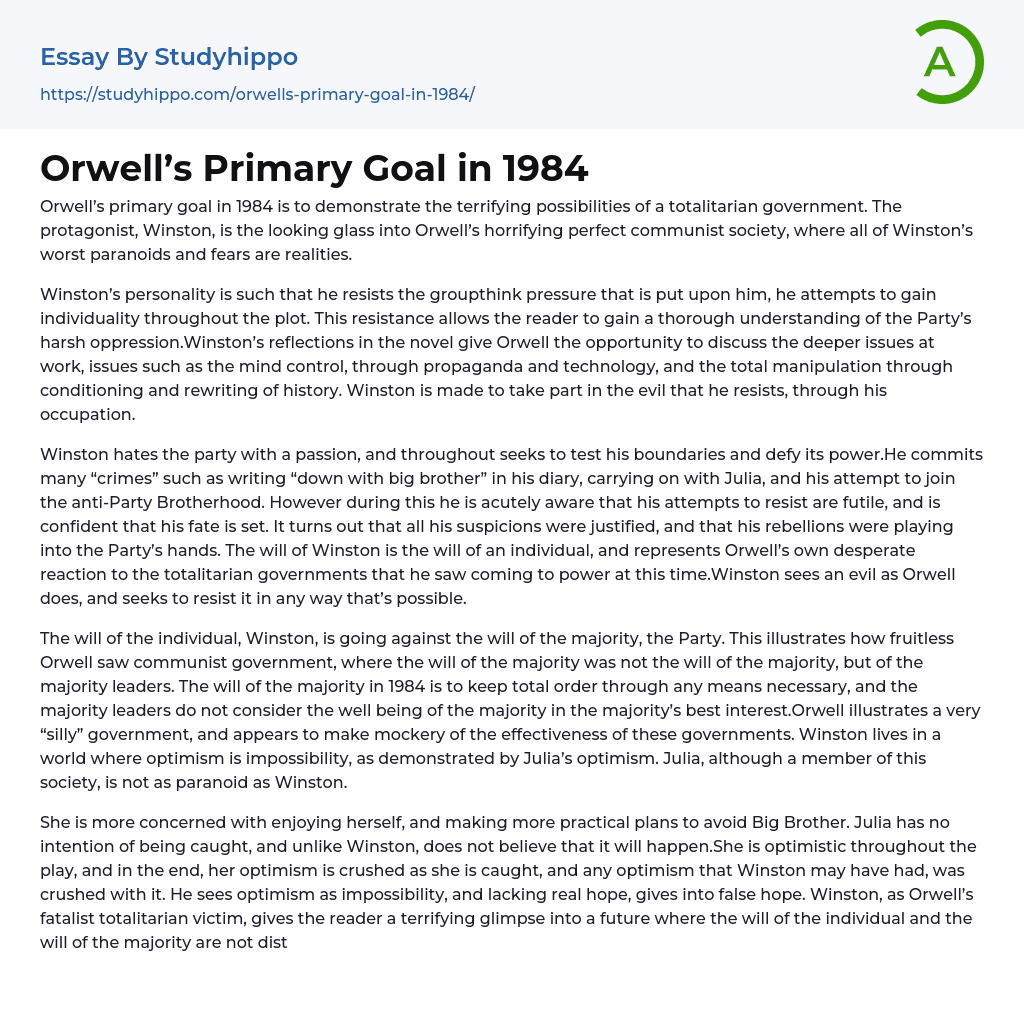Orwell’s primary goal in 1984 is to demonstrate the terrifying possibilities of a totalitarian government. The protagonist, Winston, is the looking glass into Orwell’s horrifying perfect communist society, where all of Winston’s worst paranoids and fears are realities.
Winston’s personality is such that he resists the groupthink pressure that is put upon him, he attempts to gain individuality throughout the plot. This resistance allows the reader to gain a thorough understanding of the Party’s harsh oppression.Winston’s reflections in the novel give Orwell the opportunity to discuss the deeper issues at work, issues such as the mind control, through propaganda and technology, and the total manipulation through conditioning and rewriting of history. Winston is made to take part in the evil that he resists, through his occupation.
Winston ha
...tes the party with a passion, and throughout seeks to test his boundaries and defy its power.He commits many “crimes” such as writing “down with big brother” in his diary, carrying on with Julia, and his attempt to join the anti-Party Brotherhood. However during this he is acutely aware that his attempts to resist are futile, and is confident that his fate is set. It turns out that all his suspicions were justified, and that his rebellions were playing into the Party’s hands. The will of Winston is the will of an individual, and represents Orwell’s own desperate reaction to the totalitarian governments that he saw coming to power at this time.Winston sees an evil as Orwell does, and seeks to resist it in any way that’s possible.
The will of the individual, Winston, is going against the will of the majority, the Party. This illustrates how fruitles
Orwell saw communist government, where the will of the majority was not the will of the majority, but of the majority leaders. The will of the majority in 1984 is to keep total order through any means necessary, and the majority leaders do not consider the well being of the majority in the majority’s best interest.Orwell illustrates a very “silly” government, and appears to make mockery of the effectiveness of these governments. Winston lives in a world where optimism is impossibility, as demonstrated by Julia’s optimism. Julia, although a member of this society, is not as paranoid as Winston.
She is more concerned with enjoying herself, and making more practical plans to avoid Big Brother. Julia has no intention of being caught, and unlike Winston, does not believe that it will happen.She is optimistic throughout the play, and in the end, her optimism is crushed as she is caught, and any optimism that Winston may have had, was crushed with it. He sees optimism as impossibility, and lacking real hope, gives into false hope. Winston, as Orwell’s fatalist totalitarian victim, gives the reader a terrifying glimpse into a future where the will of the individual and the will of the majority are not distinguished, but are simply blurred together through the horrifying use of technology, conditioning, and propaganda.
- Aldous Huxley essays
- Alice Walker essays
- Amy tan essays
- Anne Bradstreet essays
- Anton Chekhov essays
- Arthur Miller essays
- Augustine essays
- Bertolt Brecht essays
- Booker T Washington essays
- Carol ann duffy essays
- Charles Dickens essays
- Charlotte Perkins Gilman essays
- Chinua Achebe essays
- Christina Rossetti essays
- Consider The Lobster essays
- Edgar Allan Poe essays
- Elizabeth Bishop essays
- Emily Dickinson essays
- Ernest Hemingway essays
- F. Scott Fitzgerald essays
- George Orwell essays
- Harper Lee essays
- Homer essays
- James Baldwin essays
- Jane Austen essays
- John Donne essays
- John Steinbeck essays
- Kate Chopin essays
- Kurt Vonnegut essays
- Langston Hughes essays
- Leonardo Da Vinci essays
- Mark Twain essays
- Mary Shelley essays
- Maya Angelou essays
- Nathaniel Hawthorne essays
- Oscar Wilde essays
- Percy Bysshe Shelley essays
- Peter Skrzynecki essays
- Phillis Wheatley essays
- Poets essays
- Ralph Waldo Emerson essays
- Ray Bradbury essays
- Richard Rodriguez essays
- Robert Browning essays
- Robert Frost essays
- Robert Louis Stevenson essays
- Seamus Heaney essays
- Sherman Alexie essays
- Sophocles essays
- Stephen King essays




